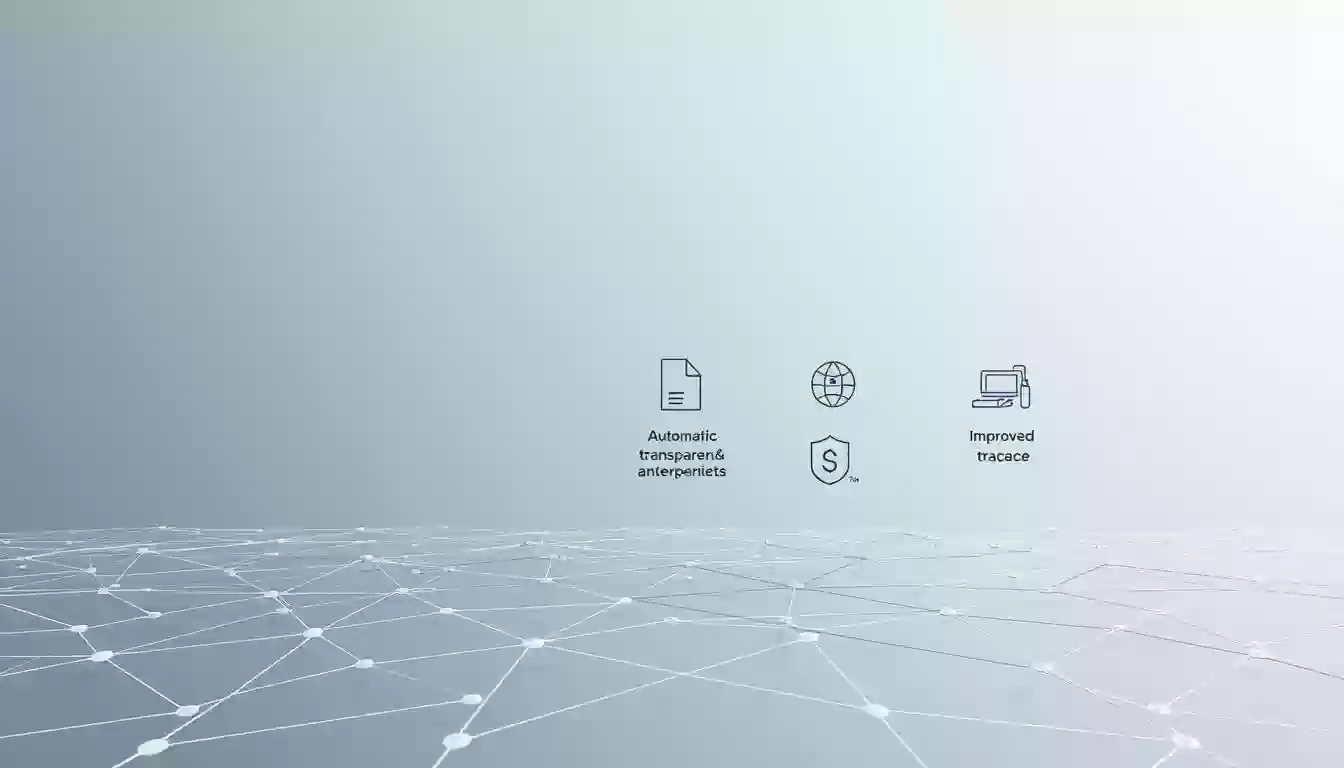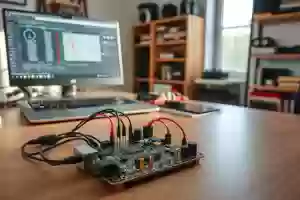Smart Contracts 101: Understand the Basics and Benefits
 08 Mar 25
08 Mar 25
Smart contracts are self-executing programs written into blockchain technology. They automatically execute actions when predefined conditions are met, eliminating the need for trusted intermediaries. This automation simplifies and accelerates transactions, making them more efficient and secure.
Imagine a vending machine: you insert money, select a snack, and it dispenses. Smart contracts work similarly, but for digital agreements. Once the terms are met, the contract executes the action without human intervention. This eliminates delays and reduces the risk of human error.
These contracts are built on blockchain, a decentralized ledger that ensures transparency and immutability. They enhance security, efficiency, and accuracy, making them ideal for various industries. From finance to supply chain, smart contracts are revolutionizing how we handle transactions.
Since Nick Szabo's early vision, smart contracts have evolved significantly. They are now integral to many systems, offering a reliable way to execute agreements without intermediaries. This guide covers both the basics and technical aspects, providing a comprehensive understanding of smart contracts and their applications.
Introduction to Smart Contracts
Smart contracts are self-executing agreements written in code, designed to automate specific actions when predefined conditions are met. They eliminate the need for intermediaries, making transactions faster and more secure. These contracts are built on blockchain technology, ensuring transparency and immutability.
What They Are
Imagine a vending machine: you insert money, select a product, and it dispenses. Smart contracts work similarly, but for digital agreements. Once the terms are met, the contract executes the action automatically, without human intervention. This process reduces delays and minimizes human error.
Core Features and Characteristics
Smart contracts are known for their automation, immutability, and precise code execution. They run on a blockchain, a decentralized ledger that ensures secure and transparent transactions. The code defines the rules and penalties, making the agreement tamper-proof once deployed.
These contracts enhance trust between parties by eliminating the need for intermediaries. They are ideal for various industries, from finance to supply chain, offering a reliable way to execute agreements without third-party involvement.
The Evolution and History of Smart Contracts
The concept of smart contracts has undergone significant development since its inception. From early theoretical ideas to practical applications, this technology has revolutionized how digital agreements are executed.
Early Concepts and Nick Szabo’s Vision
Nick Szabo, a computer scientist, introduced the idea of smart contracts in the 1990s. He envisioned a system where agreements could be automatically enforced through code, eliminating the need for intermediaries. Szabo's work laid the foundation for what we see today, emphasizing automation and security.
Key Milestones in Blockchain Development
The launch of Bitcoin in 2009 marked the beginning of blockchain's potential for smart contracts. However, it was Ethereum's launch in 2015 that brought Turing-complete programming, enabling complex agreements. This milestone transformed smart contracts from theory to practical tools, enhancing security and efficiency across industries.
These advancements highlight the journey from basic concepts to robust applications, showcasing the impact of blockchain technology on modern agreements.
Inside Smart Contracts: Code, Execution, and Key Functions
Smart contracts are built on blockchain technology, and their functionality is defined by their code. This code automates actions when specific conditions are met, ensuring efficient and secure transactions.
Understanding the Code Behind the Contract
The code structure of a smart contract is written in programming languages like Solidity. It includes state variables and functions that define how the contract operates. For example, a simple storage contract uses state variables to hold data and functions like "set" and "get" to modify and retrieve that data.
How Execution is Triggered on the Blockchain
Execution of a smart contract is initiated by transactions on the blockchain. When a transaction is sent to the contract's address, the Ethereum Virtual Machine (EVM) processes the code. This ensures that the contract runs securely and transparently, with the EVM isolating each contract's execution to prevent interference.
Contracts also use require statements to manage execution flow and handle errors. If conditions aren't met, the transaction reverts, ensuring the contract behaves as intended. Events and errors help in debugging and monitoring transactions, making it easier to track their status on the blockchain.
By understanding the code and execution process, developers can create robust smart contracts that function reliably across various applications.
Key Components and Structure of Smart Contract Code
Understanding the structure of smart contract code is crucial for building reliable decentralized applications. At its core, a smart contract consists of several key components that work together to execute predefined rules. Let’s break down these components and explore their roles in ensuring secure and efficient transactions.
Compiler Directives and State Variables are foundational elements. Compiler directives, like pragma, specify the Solidity version, ensuring compatibility. State variables store data persistently, while functions define executable actions. Together, these elements form the backbone of any smart contract.
| Component | Description | Role |
|---|---|---|
| Compiler Directives | Specify the Solidity version (e.g., pragma solidity ^0.8.0) | Ensures compatibility and sets standards for the contract |
| State Variables | Store data persistently on the blockchain | Hold information crucial for contract execution |
| Functions | Define executable actions triggered by transactions | Execute logic based on predefined conditions |
| Events | Emit signals when specific actions occur | Enable external systems to track contract activity |
When writing smart contract code, clarity and security are paramount. Developers should follow best practices, such as using clear variable names and modular logic. A well-structured contract not only prevents errors but also enhances readability and maintainability.
Data storage is another critical aspect. Storage variables persist between function calls, while memory variables are temporary. Understanding the difference is vital for optimizing gas usage and ensuring data integrity.
By carefully structuring your code and adhering to best practices, you can create robust and reliable smart contracts. This foundation is essential for building trust and ensuring smooth execution in any blockchain-based system.
Smart Contract Use Cases in Various Industries
Smart contracts are revolutionizing various sectors by automating processes and enhancing transparency. Their ability to execute agreements without intermediaries makes them a valuable tool across industries.
Real-World Applications
In the real estate industry, smart contracts can automate property title transfers and payments, reducing delays and costs. For instance, they can verify ownership and release funds securely once all conditions are met. In supply chain management, these contracts enhance visibility by tracking shipments and verifying authenticity, which helps combat counterfeiting and reduces delays by up to 50%.
Industry-Specific Examples
| Industry | Application | Benefit |
|---|---|---|
| Real Estate | Automated property title transfers and payments | Reduces transaction costs by up to 30% |
| Supply Chain | Tracking shipments and verifying authenticity | Reduces delays by 50% and combats counterfeiting |
| Finance | Peer-to-peer lending and payment automation | Increases access for unbanked individuals and reduces fees |
These examples highlight how smart contracts streamline processes, cut costs, and build trust among parties. Their role in DeFi and NFTs further showcases their versatility and potential for innovation.
Benefits and Advantages of Implementing Smart Contracts
Smart contracts offer numerous benefits that transform how businesses operate. By automating processes and enhancing security, they provide a robust solution for modern transactions.
Efficiency and Accuracy in Transactions
One of the primary advantages of smart contracts is their ability to streamline operations. They eliminate the need for intermediaries, reducing both time and costs. For instance, in real estate, automated title transfers and payments can cut transaction costs by up to 30%. This efficiency also minimizes human error, ensuring accuracy in every step of the process.
Automation plays a crucial role in speeding up transactions. With smart contracts, execution times can be reduced to mere seconds, allowing for 24/7 operation without downtime. This rapid processing is particularly beneficial in supply chain management, where it can reduce delays by up to 50% and combat counterfeiting.
Enhanced Security and Transparency
Security is a cornerstone of smart contracts. Built on blockchain technology, they provide a tamper-proof system where transactions are immutable and transparent. This transparency builds trust among all parties involved, with studies showing it can increase trust by up to 40%.
The immutable nature of the code ensures that once deployed, the terms of the agreement cannot be altered. This high level of security is vital in industries like insurance, where automated claims processing can improve customer satisfaction and reduce operational costs.
| Benefit | Description | Impact |
|---|---|---|
| Cost Reduction | Eliminates intermediary fees and reduces administrative costs | Up to 30% reduction in transaction costs |
| Increased Efficiency | Automates and accelerates transaction processing | Reduces delays by up to 50% |
| Improved Security | Immutable code ensures transaction integrity | High level of trust and security |
These advantages make smart contracts a valuable tool for businesses, offering a cost-effective and secure way to handle transactions. Their role in DeFi and beyond underscores their potential for innovation and growth.

Challenges and Limitations of Smart Contracts
While smart contracts offer transformative benefits, they also come with significant challenges. One major issue is their immutability, once deployed, the code cannot be altered. This means any errors or loopholes in the code can lead to serious consequences.
Immutable Code and the Risks Involved
The immutability of smart contracts is both a strength and a weakness. While it ensures trust and security, it also means that any flaws in the code can't be fixed after deployment. For example, the Parity wallet hack in 2017 exploited a coding error, leading to significant financial losses. This highlights the critical need for thorough testing and auditing before deployment.
Another challenge is the absence of intermediaries, which can complicate dispute resolution. In traditional contracts, parties can negotiate or seek legal remedies, but smart contracts lack this flexibility. This rigidity can lead to unresolved disputes, emphasizing the importance of clear terms and reliable code.
Additionally, the complexity of smart contracts can introduce vulnerabilities. Issues like reentrancy attacks and integer overflow can compromise a contract's security. Regular audits and adherence to best practices are essential to mitigate these risks and ensure the contract behaves as intended.
Despite these challenges, smart contracts remain a powerful tool. By understanding their limitations and implementing robust risk management strategies, developers can create secure and reliable agreements that enhance trust and efficiency in various industries.
Integrating Smart Contracts with Blockchain Technology
The integration of smart contracts with blockchain technology is a cornerstone of modern decentralized systems. This synergy enables the automation of agreements, ensuring transparency and security without intermediaries. At the heart of this integration is the Ethereum Virtual Machine (EVM), which processes and executes contract code across the blockchain network.
Blockchain serves as an immutable ledger, recording every transaction and contract execution. This decentralized approach ensures trust across the network, as no single entity controls the data. When a transaction is sent to a contract address, the EVM triggers the execution, adhering to the predefined rules. This process is not only secure but also transparent, with all parties having access to the same information.
The blockchain network's decentralized nature eliminates the need for intermediaries, reducing costs and speeding up transactions. Automated protocols maintain a constant audit trail, ensuring accountability and compliance. This integration is scalable, supporting various applications across industries while maintaining efficiency and security.
Security Best Practices for Smart Contract Development
Developing secure smart contracts is crucial for protecting digital agreements from exploitation. A well-structured approach ensures that your code is robust and reliable.
Writing Robust and Secure Code
Start by using established frameworks and libraries. Tools like OpenZeppelin provide pre-audited templates that minimize vulnerabilities. Always implement safe math functions to prevent overflow issues.
Use require statements to enforce conditions before execution. This helps catch errors early and prevents unintended behavior.
Managing Vulnerabilities and Errors
Conduct thorough testing, including unit, integration, and security tests. Tools like MythX can identify potential weaknesses before deployment.
Peer reviews and third-party audits are essential. They help catch issues that might have been missed, ensuring a more secure contract.
Consider using upgradeable contracts. This allows you to fix issues or add features without redeploying the entire contract.
Continuous monitoring is key. Regular audits and updates help keep your contract secure as new threats emerge.
By following these best practices, you can build trust and protect your digital agreements from potential threats.
Understanding the Financial Implications and Costs
Deploying smart contracts on platforms like Ethereum involves several financial considerations. One key aspect is gas fees, which are charges for transactions on the blockchain. These fees are calculated based on computational effort, making them variable depending on network congestion.
Compared to traditional contracts, smart contracts offer significant cost savings. They eliminate intermediaries like lawyers and brokers, reducing fees and speeding up transactions. For instance, real estate transactions can see cost reductions of up to 30%, while supply chain delays can be cut by 50%.
| Aspect | Traditional Contracts | Smart Contracts |
|---|---|---|
| Cost | Higher due to intermediaries | Lower, automated |
| Speed | Slower, days or months | Faster, near-instant |
| Security | Prone to fraud | Immutable and transparent |
Despite these benefits, challenges remain. Blockchain network congestion can increase transaction fees, affecting overall costs. Developers and end-users must balance these challenges with the long-term savings from automation and efficiency.

Future Trends in Smart Contracts and Blockchain Innovation
As we look ahead, smart contract technology and blockchain innovation are poised for significant growth. These advancements promise to reshape industries, from finance to supply chain, by enhancing efficiency and security. The integration of emerging technologies ensures that digital agreements become more robust and widely adopted.
Emerging Technologies and Developments
One exciting trend is the integration of AI with smart contracts. This combination enables automated claims processing in insurance and optimized logistics in supply chain management. For instance, AI can analyze weather conditions and market demand to adjust delivery routes, improving efficiency and reducing costs. Additionally, advancements in programming languages are making smart contracts more secure and easier to develop.
Another promising development is the use of oracles in DeFi. Platforms like Chainlink allow smart contracts to adjust interest rates based on real-time market data, enhancing their adaptability. This capability is crucial for maintaining the stability of decentralized financial systems.
Regulatory Perspectives and the Path Forward
Regulatory bodies are taking notice of the growing impact of smart contracts. Governments worldwide are developing legal frameworks to address the use of blockchain technology. For example, the World Economic Forum predicts that by 2027, 10% of global GDP could be stored on blockchain, highlighting the need for clear regulations to support this growth.
These regulations will play a crucial role in building trust and ensuring compliance. As the technology matures, we can expect a more structured approach to governing digital agreements, which will help mitigate risks and foster innovation.
| Trend | Benefit | Impact |
|---|---|---|
| AI Integration | Automates complex processes | Enhances efficiency and accuracy |
| Oracle Technology | Enables real-time data adaptation | Improves DeFi stability |
| Regulatory Frameworks | Provides legal clarity | Supports widespread adoption |
As smart contracts continue to evolve, businesses and developers must stay informed about these trends. By embracing innovation and adhering to emerging regulations, they can unlock the full potential of blockchain technology and drive future advancements in the digital landscape.
Conclusion
In conclusion, smart contracts have emerged as a transformative force in digital agreements, offering unprecedented automation, transparency, and efficiency. These self-executing programs, built on blockchain technology, have revolutionized how transactions are handled across various industries, from finance to supply chain management.
From their early conceptualization by Nick Szabo to their practical implementation through platforms like Ethereum, smart contracts have come a long way. They automate processes, reduce the need for intermediaries, and ensure that transactions are executed securely and efficiently. This technology has not only streamlined operations but also significantly reduced costs and enhanced trust among parties involved.
Security remains a cornerstone of smart contracts. Built on blockchain, they provide a tamper-proof system where transactions are immutable and transparent. This transparency builds trust among all parties involved, with studies showing it can increase trust by up to 40%. The immutable nature of the code ensures that once deployed, the terms of the agreement cannot be altered, providing a high level of security.
| Trend | Benefit | Impact |
|---|---|---|
| AI Integration | Automates complex processes | Enhances efficiency and accuracy |
| Oracle Technology | Enables real-time data adaptation | Improves DeFi stability |
| Regulatory Frameworks | Provides legal clarity | Supports widespread adoption |
However, challenges remain. The immutability of smart contracts means any flaws in the code can't be fixed after deployment. This highlights the critical need for thorough testing and auditing before deployment. Additionally, the absence of intermediaries can complicate dispute resolution, emphasizing the importance of clear terms and reliable code.
As we look ahead, smart contract technology and blockchain innovation are poised for significant growth. The integration of emerging technologies ensures that digital agreements become more robust and widely adopted. Regulatory bodies are taking notice, with some jurisdictions already acknowledging their enforceability, while others are still developing legal frameworks.
To fully harness the potential of smart contracts, it's essential to adopt best practices in coding, security, and financial planning. By understanding their limitations and implementing robust risk management strategies, developers can create secure and reliable agreements that enhance trust and efficiency in various industries.
In conclusion, smart contracts represent a significant leap forward in how we handle digital transactions. Their ability to automate processes, enhance security, and reduce costs makes them a valuable tool for businesses. As the technology continues to evolve, staying informed and adapting to new trends will be crucial for maximizing their benefits.
Additional Insights and Resources
Exploring the world of blockchain technology and digital agreements can be a fascinating journey. To deepen your understanding, here are some curated resources and insights to guide you further.
For those looking to expand their knowledge, platforms like Ethereum Developer Tutorials offer hands-on guides to building and deploying blockchain applications. Additionally, Chainlink's Documentation provides detailed insights into oracle technology and its role in smart agreements.
Consider exploring online courses such as Blockchain Fundamentals on Coursera or Smart Contract Development on Udemy. These courses offer structured learning paths, helping you master the essentials of blockchain and contract execution.
Joining communities like Ethereum Developers Forum or attending events such as Blockchain Week can connect you with experts and enthusiasts. These forums are great for discussing trends and learning from others in the field.
Remember, the blockchain space is constantly evolving. Staying updated with industry blogs and participating in workshops can help you keep pace with the latest advancements. Continuous learning is key to fully harnessing the potential of blockchain technology and digital agreements.
FAQ
What is a smart contract?
A smart contract is a self-executing program with predefined rules directly written into lines of code. It automates agreements, ensuring all parties adhere to the terms without needing intermediaries.
How does a smart contract work on the blockchain?
When a triggering event occurs, the smart contract executes the predefined conditions. The blockchain network validates and records the transaction, making it tamper-proof and transparent for all parties involved.
What are the main benefits of using smart contracts?
Key advantages include efficiency, accuracy, and security. They eliminate manual processes, reduce errors, and provide a trustless system for executing agreements.
Can smart contracts handle complex business logic?
Yes, smart contracts can manage intricate business logic and conditions. They are widely used in industries like finance, real estate, and supply chain for their versatility and reliability.
How secure are smart contracts?
Security is a top priority. While smart contracts are robust, potential vulnerabilities can arise from coding errors. Rigorous auditing and testing are essential to ensure security and avoid exploitation.
What is gas in the context of smart contracts?
Gas is the unit of measurement for the computational effort required to execute transactions or contracts on the Ethereum blockchain. It helps in calculating the cost of performing specific operations.
Can smart contracts be used for payment systems?
Absolutely. Smart contracts are integral to payment systems, enabling automated and secure transactions. They are commonly used in cryptocurrency transfers and decentralized finance (DeFi) applications.
How do smart contracts ensure transparency?
All transactions and contract executions are recorded on the blockchain, which is publicly accessible. This ensures transparency and accountability for all parties involved.
What is the future of smart contracts?
The future looks promising. As blockchain technology evolves, smart contracts will become more integrated into various industries, driving innovation and efficiency across sectors.





























